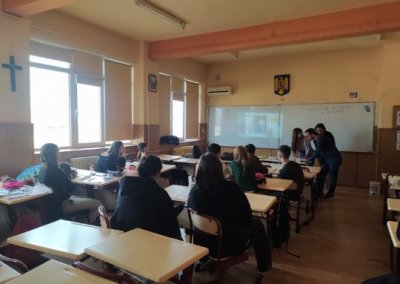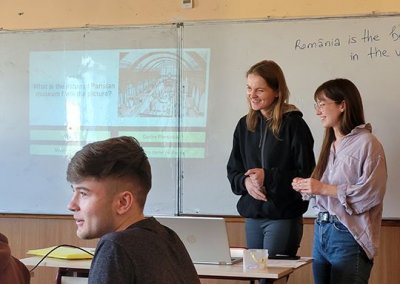Volunteering and Multiculturalism in Europe
April 13th was another sunny day among the few days of this month. For us, volunteers, the sunny days are never enough. Moreover, it is another day in which we enjoyed seeing the bright faces of the students from Mihai Eminescu College.
When we got to school, some students from the 9 B class were happy to see us more than ever. Their happiness comes from the sun, a thought crossed my mind. Their emotions were infectious, so we started a workshop about “Volunteering and Multiculturalism in Europe” with smiles on our faces.
Icebreaker
As you already know, if you read our articles, we break the ice at first. Students from the class are challenged to volunteer by coming in front of the class and choosing one paper with written emotion on it. What was interesting is that each of them has chosen different emotions and said the same sentence with different intonations. And… you’re right! Obviously, their colleagues should guess the emotion while reading the sentence.
Why did we choose this Icebreaker?! Having emotional intelligence is very important when we have a goal to achieve in teams. Indeed, teamwork and taking responsibilities brings out parts of our character that we have to accept. Absolutely, intonation and tone are equally important in our daily communication. Clearly, the way we express ourselves can be a powerful instrument in making things flow in groups, or vice versa.
In conclusion, it was a bit complicated for students to convey the emotion of disgust, anger or sadness with the sentence: Romania is the best country on earth. However, what we can say is that it was full of fun.
Why volunteering? This was the starter question of the workshop itself. Then, each of us, shared from our own experience what skills and competences we developed in our volunteering program.
ESC experience
This time, our great team of volunteers went to show students what opportunities the European Solidarity Corps program offers for young people. Ibrahim, our volunteer, also opened the program’s website and guided them through it. Clearly, to find out more about the website and how they can apply to the projects.
Multiculturalism
We chose to give students an insight about what multiculturalism is through a quiz. First of all, Doina divided them into two groups, and for each question they had one minute to talk to each other. Concretely, they had to choose one correct answer out of four or three. In detail, the questions were about food, cultural monuments, political facts, origins of technology etc. from around the world.
Undoubtedly, what was special about this activity is that from the beginning, the students tended to respond quickly on their own. Later on, they understood that it was better to discuss among themselves before answering the questions. At the end, each group answered 3 out of 10 questions correctly. It is true that nobody won, but they got a little taste of what multiculturalism is.
After the Quiz, Theo, our volunteer, explained that knowing more aspects of culture is the easy side of multiculturalism. In addition, he gave the students other concrete examples from our experience about the easy parts of being a volunteer.
Then, Theo also warned them about the difficult sides of multiculturalism, especially if they travel abroad. Also, with concrete examples from our experiences.
At the end, Lisa directed them to pay attention to the next video, to identify/name sides of multiculturalism in the video:
Lost in Moldova
The second activity was about cultural shock which is one of the difficulties of volunteering. Lisa showed them an extract of a web series called “Lost in Moldova”. After watching it, she asked them three questions.
Very quickly they realized that it was about cultural shock. After that, they were put in the situation where they had to think of ways to help the volunteer in the film. Eventually, we all realized that it’s neither easy to be a guest in a foreign country, nor to make international volunteers’ life comfortable in our home country.
At the end, the students were left with more information about what it is like to volunteer in Europe. Also, what opportunities await them after finishing school. After the workshop, they didn’t hold back on asking more questions. And we, of course, left the school satisfied and overwhelmed.
Location: Mihai Eminescu high school, Constanta, Romania
Date: 13th of April 2022
Want to see more about our Erasmus events?
Build confidence | Recognize own abilities | Broaden horizons


